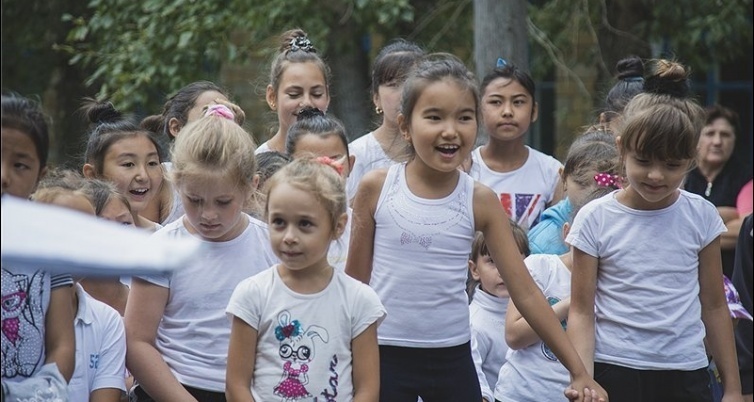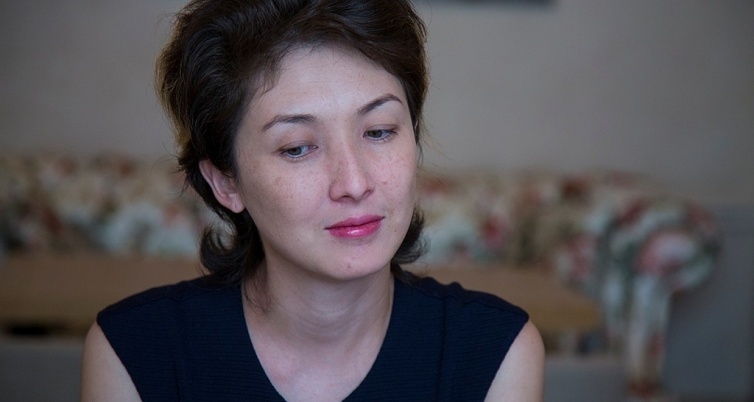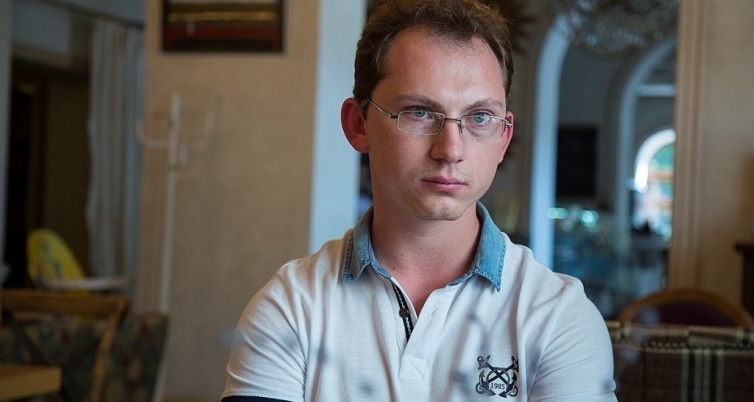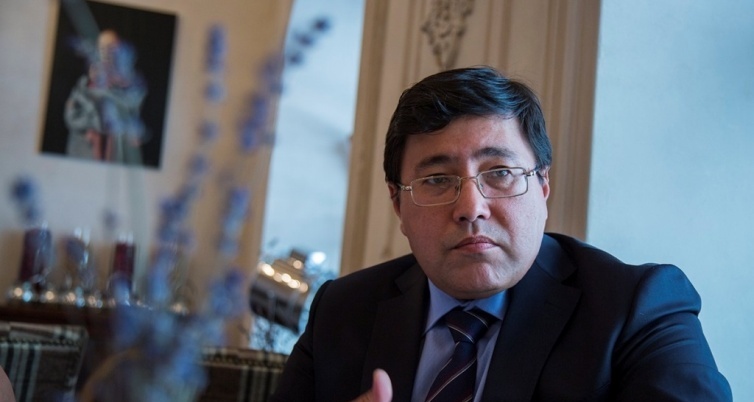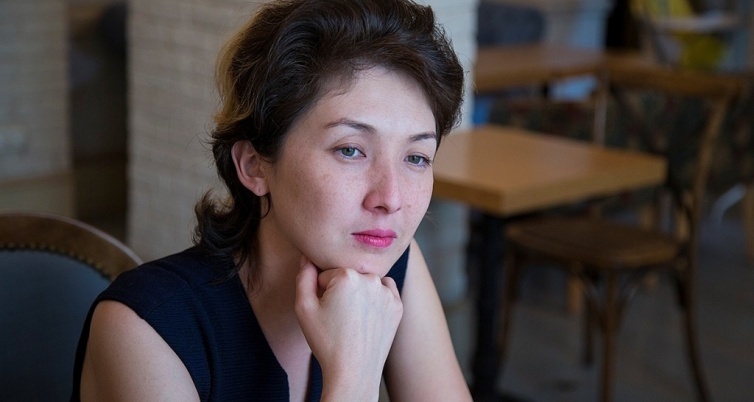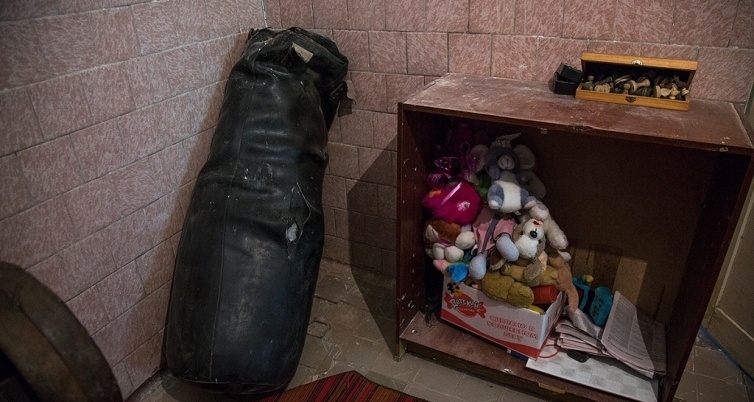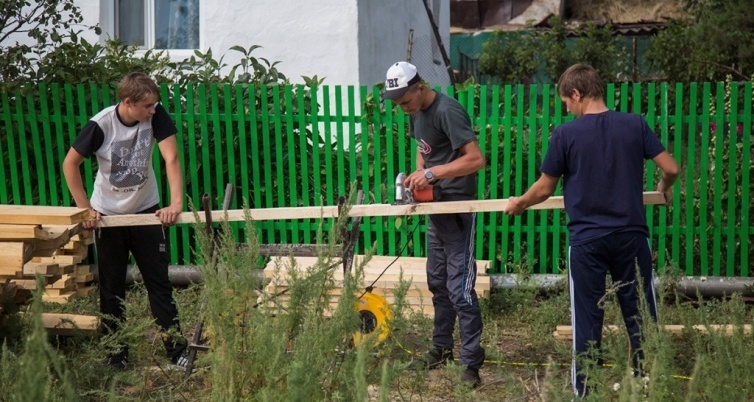Подпишитесь на наши новости:
News
другие News
European Union supports more active role of women and youth in decision-making in Kazakhstan
Qolda emergency assistance project
Qolda emergency assistance project
July 4, 2018
Survival school: financing rural schools
In 2015, a unique project "3.2.1 START!", which had already been successfully implemented in Turkey, Iraq and Pakistan, was launched in the rural schools of Arshaly district of Akmola region. As part of the project, a large international company improves the infrastructure for physical education classes in rural schools, while also raising the level of preparedness of rural physical education teachers.
We met with Alima Isembayeva, the corporate relations director of Coca-Cola Almaty Bottlers; Rinad Temirbekov, the executive director of the Eurasia Foundation of Central Asia; and Andrei Bachishche, the project fund specialist. We talked about why businesses sometimes need to duplicate the functions of the Ministry of Education.
This summer, in the framework of the project "3.2.1 START!" In the Arshaly district:
-
19 rural schools were equipped with sports equipment: about 70 pieces of sporting equipment were purchased;
-
1700 units of equipment for sports, table games (e.g. ping pong), and gymnastics were delivered;
-
Installation and repair work was carried out in three schools;
-
33 teachers were trained in new methods of teaching physical education; and
-
in general, more comfortable conditions have been created for about 3000 students of rural schools in the Arshaly district.
"We did not expect everything to be so bad”
Svetlana: When beginning the pilot project, you were considering two regions - the Arshaly region of the Akmola oblast and the Aksuy region of the Almaty oblast. You eventually chose the first one. Why?
Rinad: The problems we identified in these areas were approximately the same. As a result, the organizers decided not to waste resources and instead focus on one area. We decided to be closer to Astana - in case we need to contact the Ministry of Education, involve deputies, etc., then it is easier to do than in the Aksu region, which is far from Almaty.
Alima: There are two more points to mention. The most basic is the degree of involvement. In the Aksuy district, the response to our inquiries was less active than in the north. In the Arshaly district, people were very excited about the project. The second point is the location of the Coca-Cola Almaty Bottlers plant in Astana — it is extremely important for our company to, first and foremost, support the regions in which we operate. Business development and social activities are parallel processes for us.
Andrei: When entering a new district, especially with a pilot project, our Foundation tries to involve all stakeholders in the implementation of the project in order to achieve maximum efficiency and sustainable long-term results. So if we compare the initial readiness for cooperation between the administrations of Arshaly and Aksuy rayons, the former was given preference for a number of reasons, the main one being the Akims' interest in the proposed project model. In the Arshaly district, the Akim expressed his readiness to provide full support and assistance to the implementation of "3.2.1 - START!”, taking it under his own control, while the Akim of the Aksuy region did not even meet with us.
Rinad: But we did not immediately go to the Aksys or Arshaly regions. First, we took the Akmola and Almaty oblasts and compared all of their indicators. There was also another criterion: the existence of NGOs. We separately contacted NGO leaders to find out whether the population of the region is active and, if so, how active it is. Only after did Andrei do research on the spot: he studied the opinion of children and parents and met with Akimats and schools.
What are some unexpected things you encountered?
Rinad: It's hard to say. In theory, it’s not the first time that we’ve worked in rural areas. Our foundation has a strategic mission: work in the field of education. But this is the first time that we’ve worked with physical education. Our big discovery was that the kids are not satisfied with the physical education they currently receive. They mainly learn about different kinds of sports, while girls, for example, did have lessons in gymnastics, fitness, dancing, yoga, etc. I'm not even talking about the lack of basic amenities and hygiene, especially for girls. Very often, there are no dressing rooms in schools — not even separate ones. Sometimes, even in new schools, there are street-style toilets without any amenities, and finally, there is the widespread lack of sports equipment and general supplies.
Alima: I did not expect rural schools to not be equipped with basic equipment for physical education.
Andrei: Unfortunately, even today, there is a practice of collecting money from parents in order to purchase sporting equipment, make all kinds of repairs on the school infrastructure, etc. Given the extremely low wages in the village, from 25 to 40 thousand tenge/month, even such fees significantly impact the family budget of an ordinary rural family.
Rinad: Teachers themselves are depressed by what is happening. They tell me modestly: this is the teacher's lounge. This is the best case scenario. More often than not, it's a hole in the wall, tightly closed off by a door, where there is some leftover equipment from the old inventory of the Soviet past.
Alima: There was also such an interesting moment: if the parents are active in the village, then the school is well equipped, there, in principle, everything is there. If parents are inert, then in school there is nothing. Therefore, the involvement of parents is important here.
Rinad: The biggest surprise was the gap between what is written in the curriculum — let's not forget that these are public schools, not private ones — and how things really are. We looked at the inventory list — there are hundreds of things that should be in the average school… but they often are not. It is striking that some of the schools are not at all adapted to winter: there is no heating. At the same time, parents cannot take everything upon themselves. We used to think that, yes, there are probably problems with physics, mathematics, and highly intellectual objects, but here, physical education, the basis of a healthy lifestyle, is lagging. I am rooted in the Soviet past, I remember our schools, and you know, with all their shortcomings, there was variety. Now there isn’t. It is especially striking that this is happening about 18 kilometers from Astana.
Svetlana: Alima, where did it all start? Why did Coca-Cola pay attention to the problems of rural schools? Where does your interest come from?
Alima: To be frank, everything is very pragmatic. Coca-Cola is the source of much controversy around the world. We, as a company, understand that it is much more efficient, productive, and honest to organize projects related to supporting an active lifestyle rather than simply explaining that you must “burn” everything that you consume. As a rule, most of our projects are related to children and the younger generation in general, because in the future, they will continue with the lifestyle that they have had since childhood. Accordingly, we implement such projects in every country where we operate. We want to show that we are responsible citizens, that this is our corporate ethic. We are a company that supplies food, so it is critical for us that the population is healthy, socially, and economically prosperous. So we make our contribution to this cause. We needed a project that, first and foremost, would cover the least prosperous regions of the nation. Second of all, this project needed to be social. If you look at the project materials, you won’t find our logo anywhere. This is a purely social project. "3.2.1 Start!" educates others about leading an active, healthy lifestyle.”
"There is a feeling that the school principals were scared away sometime in the 90s"
Svetlana: Did you collaborate at all with the Ministry of Education?
Rinad: Yes, we even managed to go to one of the departments, and we had a personal meeting with them. The Ministry of Education said the following: everything related to schools is more a priority of the regional authorities, that is, of the region and the district, and then you need to get in touch with them and correct problems. On the other hand, they said that there absolutely are problems, and one of them, from their point of view, is that it is necessary to modify the curriculum in universities which train physical education teachers, given that they do not have adequate teaching and coaching skills. One of the solutions is for every physical education teacher to be an athlete, so that they can inspire others with their example. The Ministry has this approach. But at the same time, they’ve confessed that it isn’t so easy to change the curriculum and they already tried to do so several times, but with very limited success. We did not insist on any cooperation, agreed that we will inform the Ministry, and keep them up-to-date. Meanwhile, they’ve decided to work out their own opinion and recommendations. Now, we will make a second attempt to work with the ministry on more concrete issues: for example, on methodology. In the curriculum, three hours are set aside every week for physical education lesson. Two classes are compulsory, the third is optional, left up to the generosity of the very leadership of the school. It’s obvious that the knowledge and preparation vary among the physical education teachers; it’s even noticeable in our training. Someone is more prepared; someone is new at something. So I think that one of our possible proposals to the state is the integration of techniques that don’t require any remarkable costs, like, for example, smart fitness. It would be good to develop a training manual and use the video that we shot at the training.
Alima: We want to gain experience now so that we can later come to the state and say: we’ve made such-and-such developments, let's work together.
Andrei: At the same time, you shouldn’t reduce everything to the work of the Ministry of Education. It’s important to understand that there is a set bar, regulated at the ministry level, and the actual state of things, which is often embellished on the ground. As a rule, the implementation and achievement of assigned tasks and standards are entrusted to local departments of education. The latter, in turn, should soberly assess the situation of their schools and request the appropriate funding. But there’s a problem here, too: money is usually allocated to applied subjects, but not physical education. According to many school principals, no one really knows how the distribution of budget funds works at the level of local Akimats. Sometimes it comes to the fact that unsettled amounts are returned to the Republican budget, although school problems remain unresolved.
Svetlana: How did you interact with the local authorities?
Rinad: The interaction with Akimats was productive. There are times when there is no relationship at all, or when the relationship is too demanding. But in this case, the Akim, presumably, was himself interested in improving the situation. He even had his own ideas about what can be done to develop regional physical education parallel to our project. But because of the budget deficit, his ideas were not implemented...
Rinad: It seems to me that the specificity of Kazakhstan is as the proverb says: "seven nannies have a child without eyes." In the presence of the Ministry of Education and the regional departments of education, schools are often forced to survive on their own. The whole initiative, which is born and supported at the level of the authorities, comes primarily from the Department of Internal Policy. There, people are still active, perhaps because of the fact that they have to solve a wide range of social issues and because this department has the real authority to organize interaction between various local authorities. And the Department of Education is too regulated, they work only within established parameters. It should be noted that there are regions of our country where the position of local departments of education, on the contrary, is very active and innovative.
Svetlana: I was surprised that schools receive virtually no funding...
Alima: I can’t speak to that. They are financed, there were even repairs. When we talked to Tatyana Nemtsan, the director of the Vyacheslav School, she said that money is allocated; it depends on how much the director can "knock out." Tatyana, for example, is a very active woman; she met with deputies and ministers. So she gets funding.
Rinad: There’s a feeling that school principals were frightened sometime in the 90s. Here in Almaty, there were some projects related to greenhouses and gardening. The principles were afraid of any initiative at all, afraid to mobilize their parents. They told us: why do we need this after the finance committee tried to check us, slapped everyone on the wrist for breaking budget discipline and all that? Now none of them is going even try to show at least some entrepreneurial initiative related to the economy. Although there have been some changes in this regard, at present, public associations are being formed on the basis of many schools, and they are aimed specifically at attracting investments to meet the schools’ needs, through the implementation of various projects. But, unfortunately, the school staff, especially those in rural areas, do not yet have the necessary skills and experience in this area. We, in turn, conducted a training on project management and fundraising for school principals and physical education teachers as part of "3.2.1 - START!" so that each school could develop its own project in the field of healthy lifestyles; each also received a small grant. That is why we selected 18 schools in the Arshaly district to receive funding from us. But this is just a drop in the bucket, and such work needs to be done more systematically.
Alima: They must be very public in this regard. If you do something, then do it so that everyone knows, so that you won’t be strangled tomorrow.
Andrei: The state allocates money, but it does so haphazardly. Take, for example, the Sarybiskaya School. The director tells me: “now that we’ve been given money, I have the opportunity to choose where to spend it: either to buy new computers, to repair windows in the gym, or to do heating repairs. She can to choose only one thing. I, of course, persuaded her to put windows in the gym put, but she needs computers more, so that students don’t lag behind in computer science. So there is a redistribution of resources, but the options are always limited.
Svetlana: Last week, the Ministry said that they are going to get rid of under-enrolled schools. But you still invest in them, despite these plans.
Alima: The closure of under-enrolled and lower-capacity schools is not a one day process. First of all, it is very budgetary; you need to do something with the teachers and the children. It will not happen tomorrow. Right now, this school exists, and who knows? Maybe during this time, before the ministry reaches it, it will stop being so small.
Andrei: We still need to understand that, other than school, there is nothing to do for children in the countryside at all. There is no leisure outside of school. Most often, there is one shift, and at 12 o'clock in the afternoon, the children are already left to their own devices, and more often than not, they go to the gym.
Rinad: And then there's this point: it's not that a rich uncle came and built something. There is societal contribution here. We only give materials, and maybe we take on the largest jobs. The rest is done by the locals themselves. Until the population is not involved in and in charge of the environment, it’s pointless. You can build anything, and tomorrow it will all be torn down. In depressed areas, it is important to carry out such work so that people somehow become more active and realize that everything is up to them: they can clear the site, fill it, level it, and not wait for a large company to do everything for them.
"We did not build where we were asked to by the akimat, we built where it really was needed"
Svetlana: What did you discover when communicating with teachers?
Rinad: In principle, it turned out that people are all different and their level of knowledge is different. There are those who are above average. For example, Vyacheslav Savvatiev of the Vyacheslav school has a unique methodology - he records and monitors the progress of his students, maintains a separate diary for each one. This really is a very interesting approach. Or we look at the order in which they keep all their inventory, how they develop their team. Therefore, the first is, of course, the conclusion that everyone is at a different level, but there are gems who have a much richer experience. One of the tasks of our project is to accustom them to the fact that they are a professional community, that is, to raise the self-esteem of teachers so that they understand that they can be a good resource for each other. We started training with fitness, since this is a basis for them, but there have been other requests. Some teachers aren’t big fans of fitness, and instead prefer football, basketball, or volleyball. Their requests: tactics, strategy and some training moments. They are interested in exporting children to major sites in Astana and spending one or two trainings there. I think that if possible, we will try to make this happen.
Svetlana: You talked about raising the status of physical education teachers, but still in the public mind, the physical education teacher is on the same level as the wood shop and war prep teachers. How can this be fixed?
Rinad: This stereotype is hard to change. When we made a call for applications, we said that the project should not be written by a principal, but by a physical education teacher. And when we visited schools for applications defenses, many directors tried to defend the applications, but we said that we all understand and respect them, but want to listen to the physical education teacher. We learned that the teacher has a slightly different idea of what is needed than the director. Their attitude towards themselves began to change. When we arrived, they were already speaking on the same level; the director considered them.
Svetlana: I understand that one more advantage of the project is that you taught physical education teachers to write applications for grants.
Alima: Maybe they didn’t teach them per se, but they did at least open the door, show them how it's done. There are other grantmakers, and if at least two or three teachers start to independently seek opportunities to receive assistance, that would be super. But let’s return to the notion that physical education has never been a priority. I came and talked to the teachers: I asked how to get kids to come to gym class (I remember how we tried to run away in our time), and they tell me that everyone comes to class there; that it’s their only entertainment. They can play here, exercise after school; it’s the only recreation in the village. They don’t have the same problems as one would in the city. So for me it was a kind of discovery. Based on what I saw, I believe we must give children the opportunity to better engage in physical education. It needs to be more interesting, useful, fun. As for the teachers themselves, I agree that yes, opinions differed. Sometimes, meetings ended in tears.
Rinad: Before that, we had a discussion: do we support several schools or all of them? But when we sat and looked at the reaction of teachers, we decided to help everyone, because they literally tearfully defended their budgets with tears in their eyes.
Alima: Once, the Akimat asked us to make a soccer field for one of the schools. The school does not need anything else; a nearby school will use the field. When we went to visit the school and see the application, there was not a word about the field. We asked the director if we could see the field. "What field?" she said. They didn’t actually need the field — they needed sports equipment.
Rinad: We did not build where we were asked to by the akimat, but where it really was needed. When we arrived at the Nikolaev School and saw that the kids themselves welded shells, we realized that they want to do exercise, play sports. So we helped them build a hockey rink.
Alima: In some schools, principals didn’t approach us. So we immediately changed our attitude: well, it means our assistance isn’t needed here. Then we talked with the gym teacher, saw his drive, and realized that we can’t refuse him.
Andrei: When we looked at Turkey, we realized that one of our tasks is to inspire educators. And this problem was solved.
Rinad: Another question is how long this drive will last.
Alima: It's our job to support it.
Svetlana: You conducted a very important training for teachers.
Rinad: Material support should go hand in hand with the methodical. If you invest only in one building, then there will be no effect. We need to work this way: yes, we will help you, no questions asked, but make an effort, start working. We gave schools equipment on one condition: they have to do a quality job.
Svetlana: I know that it was difficult for you to find specialists who could conduct training for physical education teachers. You even turned to the Ministry of Education, but as a result, coaches from the sports center were invited.
Rinad: Andrey addressed methodological centers - both regional ones ("Orleu") and those in Almaty. Then we analyzed and decided - well, teachers just barely get to these advanced training courses, and we probably can’t get anything original from them. We decided to run an experiment: we got in touch with the fitness center — which has its own system of advanced training for its managers — and asked them to share their practical knowledge with us. We are glad that these trainers responded. Now we are thinking that we should go further on this path. Alima suggested working with established athletes.
Alima: To be frank, I'm not entirely satisfied with the methodical part. Yes, fitness is interesting, but teachers need to learn classical techniques, for example, methods of teaching “game sports.” This training didn’t teach any games which children can play outside of school. I want to find athletes who could teach professional skills. We will continue to use new techniques. Arshaly is our pilot project. We will continue, and now we see that a lot could be done differently. And it’s clear that next time we will take this into account. One thing remains unchanged: we must listen to the gym teacher; he must give us information. He is our contact person. The second point: we must meet the needs of children.
Svetlana: What do you expect from the sports festival, which will be held in October in the Arshaly district? Will this be a result of "3.2.1 START!"?
Rinad: We teach teachers: you were trained, you got equipment, now you have to introduce something new into your teaching. We give you time — prepare. The festival will be a kind of showcase. Each school will exhibit its own group and do exercises based on its new equipment and fitness techniques. The festival is an occasion to invite parents and put on a show for them. Maybe there will be deputies, maybe they will help us in the future. The tasks are multifaceted.
Svetlana: You said that there will be trainings. Next year?
Alima: No, that's it. We sparked something and need to support it. For this reason, we are trying to create a group for physical education teachers in the "My World" social network. Now we are going to make some videos of the training exercises, and hope to share them there. Then we want to find some active people from his pool of athletes — hopefully, they will continue to be with us in other programs, become ambassadors, and conduct their own trainings themselves.
Rinad: It’s that they — not we — should explain everything to their colleagues in other regions what's what and who is it for. It’s better for everyone. You can trust such people more.
Svetlana: Next year, what are your plans?
Alima: Most likely, "3.2.1 - START!" will continue in the region. We do not know yet whether we will stay in the north. Of course, we will take into account such things as small schools. As of next year, we are going to involve our partners, with whom the Coca-Cola Company works. We work with distributors throughout Kazakhstan — perhaps we will announce a call for each distributor to choose and help a school. But right now it’s hard to talk about this, because the results aren’t available yet. But in Turkey, it worked great — distributors took schools under their wing.
Svetlana: Has there ever been a similar project in other CIS countries?
Alima: No, there hasn’t. Negotiations on the introduction of such a program are underway in Azerbaijan. Maybe the program will be based on Kazakhstan.
Svetlana: Are you ready for another large company to join this project?
Alima: If you pay attention, you will notice that our project is not branded as a product; you won’t see our banners anywhere. This is social. We work here as a company, not as a product. Another question is that at first, we would like to understand is what the results of the project are and what we’ve managed to achieve. Only then can we make a decision on further development. If our expectations coincide with our achievements, and other companies want to join, we are open to that. Ultimately, the more resources and schools participate, the better.
Rinad: Someone might say: why do what the state should do? But really, the issue here is not about replication governmental efforts, but about the future generation. It is necessary to involve local beneficiaries as much as possible in such projects. We had the idea of going to the local business community. Small companies help schools; if someone likes soccer, they help with soccer; if someone likes tea-houses, they open a teahouse. But here we have a large international company that has tested this in other countries, so we can come to local companies and say “here is the methodology, help, as other have previously helped; just ask if schools really need it.”
Svetlana: Alima, in the history of the company, has it ever happened that the project wasn’t successful?
Alima: This has never happened. Globally, it is called "3.2.1 Move,” which is an umbrella brand. It is now operative in Turkey and Pakistan, where the project went very well. In Turkey, we had unexpected successes. Additional sponsors, company employees joined in. The wave spread throughout the country, which indicates that the project worked. It will work in any case; it's a matter of trial and error. Each country has its own characteristics. For example, in Turkey, they do not work with local authorities and go directly to schools. There is a higher level of civil liability. We need to use levers like the Akimat which can force teachers to come on the first day of training. They don’t want to, but they do and then have fun, and can’t wait for the second day of the training. In Turkey, they go from the bottom up, but we go from top to bottom. This is a feature of our mentality.
Source: http://vlast.kz/life/13140-coca-cola.html




